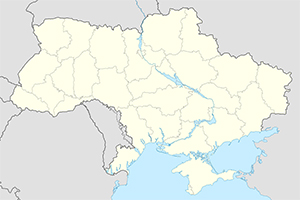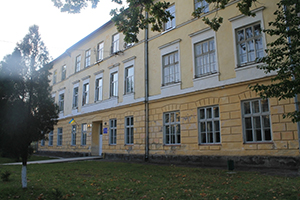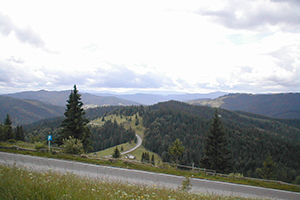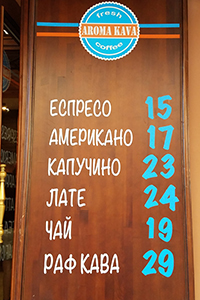6.3 Genitive Case with Expressions Of Quantity (Exceptions)

In this module, you will be introduced to the most common and important exceptional forms of nouns in the genitive plural.
Завда́ння 1
Note the exceptional genitive plural endings on the bolded nouns.

– Це все ва́ші ре́чі?!
– Так, ми ма́ємо бага́то рече́й…

– Скі́льки областе́й в Украї́ні?
– Два́дцять чоти́ри о́бласті і респу́бліка Крим.
Complete the sentences below paying careful attention to context and to what you have learned about the use of expressions of quantity thus far.
Важли́во!
A number of nouns take the exceptional ending –ей in the genitive plural. Most of these are feminine nouns that end in a consonant or a soft sign in the dictionary form:
одна́ ніч → шість ноче́й
одна́ річ → бага́то рече́й
одна́ о́бласть → кі́лька областе́й
A few plural only nouns take the same genitive plural ending and have to be memorized:
одні́ две́рі → кі́лька двере́й
мої́ гро́ші → небага́то гроше́й
Finally, the noun сім’я́ and nouns люди́на and дити́на also take this exceptional genitive plural ending:
одна́ сім’я́ → кі́лька сіме́й
одна́ люди́на → бага́то люде́й
одна́ дити́на → ма́ло діте́й
As mentioned in Unit 2 on plural nouns, люди́на and дити́на are among those few nouns that have two nominative plural forms, depending on whether one says 2, 3, or 4 “children”/”people”, or “children”/”people” in general. Therefore, note how the noun forms will differ depending on what numeral they follow:
одна́ люди́на – дві люди́ни – де́сять люде́й
одна́ дити́на – три дити́ни – п’ятна́дцять діте́й
Завда́ння 2
You will hear eight utterances. Choose the most logical response for each of them.
Transcript – Завдання 2
- Скільки сімей тут живе?
- Ми маємо так багато речей! У валізі вже зовсім немає місця.
- Скільки людей було на лекції?
- Я погано сплю вже кілька ночей!
- Ой, тут так багато дверей! А де твій офіс?
- Влітку я подорожувала по Україні і відвідала кілька областей на Сході.
- Ми ще маємо трохи грошей на гарну вечерю в ресторані?
- Вони одружилися і вже мають кілька дітей!
Завда́ння 3
Note the stem changes in the bolded nouns from the dictionary form to the genitive plural in the examples below.

У мі́сті є три́дцять шкіл. Це шко́ла но́мер 8.

– Це доро́га в Карпа́ти?
– Тут є кі́лька дорі́г в Карпа́ти. Це доро́га в мі́сто Яре́мче.
Read the dialogues below and mark all of the nouns that follow numerals or other expressions of quantity. Then answer the questions that follow.
Важли́во!
As seen in the activity above, some feminine and neuter nouns that have an –о– or –е– in the stem will replace it with –і– in the genitive plural. It is always the last vowel before the ending of the noun’s dictionary form that changes. The rules for which nouns undergo this change and which do not are very complex, so it is best to simply memorize the most frequently used nouns in which this change occurs. Remember these seven nouns:
одна́ гора́ – бага́то гір
одна́ осо́ба – бага́то осі́б
одна́ шко́ла – бага́то шкіл
одна́ доро́га – бага́то дорі́г
одна́ робо́та – бага́то робі́т
одне́ сло́во – бага́то слів
одне́ село́ – бага́то сіл
Завда́ння 4
You will hear six unfinished statements. Choose the most appropriate noun form to complete each sentence.
Transcript – Завдання 4
- Доброго дня! Я хотіла б замовити столик на вечір на шість…
- Завтра я маю тест і мушу вивчити тридцять…
- Це моя вулиця. Тут є дві…
- Мій брат працював у банку, в аптеці, на фермі… Він мав багато…
- Тут недалеко є кілька…
- В Карпатах ми бачили багато високих…
Завда́ння 5
Note how the bolded noun, which is a neuter foreign borrowing, does not change its form in the genitive plural.

– Я хо́чу еспре́со.
– Про́шу да́ти нам п’ять моро́зив і п’ять еспре́со.
Consult the menu and type in the missing endings and correct amounts (in numbers) in the text below. All prices are given in Ukranian hryvnias. If no ending is needed, type in -.

Мо́вний пазл
Look through the activities you have just completed and choose the correct statements below to summarize what you have learned.
А тепе́р тест!
Read the dialogue below and fill in the blanks with appropriate forms of the following words:
гроші | річ | гора | ніч | особа | село | дитина | дорога


